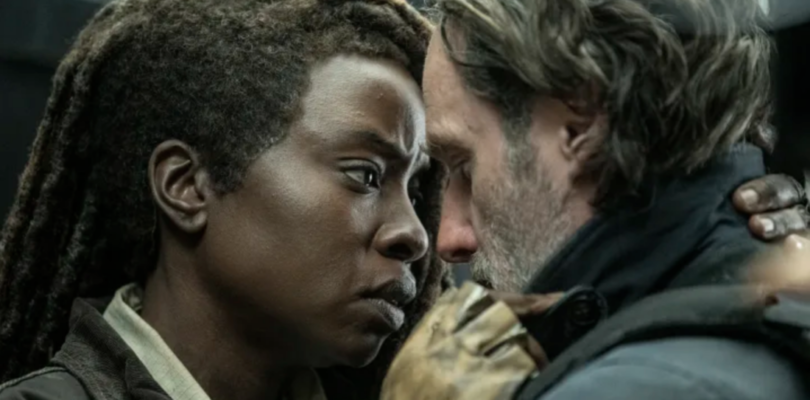AMC recently concluded its six-episode limited series, The Walking Dead: The Ones Who Live. Rick (Andrew Lincoln) and Michonne (Danai Gurira) are determined to find each other again and hold onto what keeps them going in this seemingly hopeless post-apocalyptic world.
The series continues its equally beautiful and brutal display of human will in the face of death, which is emphasized through a love story that’s been carefully crafted over the years to withstand anything and everything.
We’re met with Rick, working against his will for the people who saved him five years prior on the bridge. Thus begins a years-long battle of Rick trying and failing to run away from the CRM (Civic Republic Military) compound to go back home. He almost loses his mind trying to escape this nightmare, even contemplating suicide.
Rick is given a saving grace in Lieutenant Colonel Okafor (Craig Tate), who keeps the CRM from punishing Rick for his escape attempts. Okafor has his redemptive reasons for doing this, so we’re also given another character, Esteban Garcia (Frankie Quinones), who has nothing to gain from helping Rick, a reminder of good faith humans. The heroes of this world have always fought for compassion. Now, the audience is given the gift of seeing that same compassion offered back to Rick.
Playing the long game as a CRM soldier, the stakes are raised as Rick goes head-to-head with Pearl Thorne (Lesley-Ann Brandt), a soldier who we learn over time is not an ally, and Major General Beale (Terry O’Quinn), who runs the CRM and is the one we feverishly anticipate Rick will take down. Is this CRM storyline as fascinating as it would be if you hadn’t seen the CRM’s first-hand destruction in The Walking Dead: World Beyond spin-off? I don’t think so. (If you can stomach the bad wigs on that show amongst other things, it might be worth watching for more CRM context.)
At this point, there is so little hope left for Rick to hold onto. Fighting from the inside is his last shot. He’s understandably shaken to his core navigating this space. It’s gut-wrenching to see the hero succumb to the enemy, his will to fight disappearing before our eyes.
The series invites us in on the promise of a romance and keeps us seated with intimate moments that we rarely get to see heroes wrestle with. Rick is alone. He has no one to save in the immediate, so here and now, he is able to slow down and sit with everything that has happened. He has distance, in time and space, from all of those he holds dear, and must choose whether or not to fight with no promise of ever seeing those he fought for ever again. When no one is looking to you, what do you do?
Six years after the bridge, we follow Michonne. She has set out to find Rick, not knowing if he is dead or alive. On her way towards him, she befriends a man named Nat (Matthew Jeffers). While Rick is at the CRM giving into the worst of humanity, Michonne is reminded every step of the way that hope and kindness aren’t obsolete. How pitch perfect that the title of the second episode is titled, “Gone.”
Nat is the force that keeps Michonne going, that pushes her not to give up on her search for Rick. While this keeps Michonne going, Rick’s hope is all but drained. Contrasts like this are the storytelling heartbeat that keeps this show alive, that makes this world such a magnet for viewers week after week, year after year.
When Rick and Michonne are finally reunited, they also come face to face with enemy and CRM loyalist, Jadis (Pollyanna McIntosh). The stakes are, once again, significantly raised. It was in this moment that fear completely enveloped the decision making process for Rick. Just when he thinks it can’t get any worse, all hope is truly lost.
It was beautiful to see Michonne nursed back to hope and it became her turn to do the same for Rick. Michonne also plays the long game, becoming a consignee. When the opportunity presents itself on a CRM run, she pulls Rick out of the helicopter during a thunderstorm. This is when the reckoning begins, the best episode of the show.
“What We” was written by Danai Gurira. After twelve years and over one hundred and twenty five episodes in this world, it’s hard to believe this is her first writing credit on the show. But it was well worth the wait. In this episode, Michonne and Rick find themselves sheltering in an apartment building. It is here that they face head on the reality of their relationship now, their future, and how they can still get it. An intimate apartment setting with two lovers coming to grips with the vulnerabilities that will either consume them or breathe new life into them is a story that lets you know a playwright definitely wrote this episode. The dialogue is top notch. It’s a grand slam tennis match as Michonne gives Rick a safe space to unpack his trauma.
The title of the episode is so powerful because it is unfinished, reflecting the unfinished business that Rick and Michonne have together and must reconcile with in order to move forward. Rick is scared out of his mind. They can’t move forward if they aren’t of one accord. They have to take this moment to debrief. You can feel the tension, the powerlessness, the vulnerability through the screen. It will make the hairs on your skin stand up.
As their discussion dies down, they discover that they are presumed dead. They could go back home, make arrangements to protect themselves from the CRM, and the series could have ended right there.
Instead, in one of the most agonizing moments of the series, we watch as Michonne leaves the apartment and waits in the hallway for Rick to join her in her fight against the CRM. He doesn’t come right away. When he finally does, a CRM blast from the building beside them causes exit issues. Tension builds as the walls buckle around them. They are out of sync in their killing of walkers. You can feel the unevenness of the relationship thick in the air. This conflict is earned and it’s a work of art.
After a near death experience caught in a stairwell with walkers all around, they buck up and escape, and Rick’s emotional walls finally buckle as well. The two ride away. It’s a triumphant moment, leading us into the calm before the storm. A honeymoon phase so to speak. But of course, it’s not that easy.
It’s difficult to believe that Rick and Michonne would get sloppy on their way home, even after believing they are presumed dead. But they’re reunited and can finally take a moment to let their guards down and be happy. Whether or not we want to believe it, the bliss of being reunited clouds their judgment and that’s how Jadis follows their trail.
We’re forcibly held by the hand in the direction of trying to humanize Jadis through flashbacks with Gabriel (Seth Gilliam) as she attempts to make amends with herself. Too little, too late. We don’t need those scenes with Gabriel to confirm what we already knew. She cannot be redeemed, not in a six-episode mini series. It’s an unfortunate send off for her, but a solid juxtaposition of what happens when you let the CRM consume you vs. not. In the penultimate episode, we see the overall theme of the show… what we become in the end when we give in to the man-made enemy and what we become when we fight against it.
After being bit by a walker, Jadis tells Rick and Michonne where the dossier is so that they can destroy it. Her dying act is a surprise to everyone as Jadis pulls out a ring and tells Rick to marry Michonne. It feels unnecessary after the dossier instruction. Her secret relationship with Gabriel doesn’t do her any favors. Some people are unredeemable. Leaning into that fully would have given her more dignity than wavering in death.
Free from their second greatest enemy, Rick and Michonne become engaged. This is an especially satisfying moment, considering we don’t see into the future of the two having a wedding. This engagement is the moment we are meant to savor. Is it enough? No. But we understand that timing, casting and budget may not have allowed for more Alexandria closure and so we suck it up.
This brings us to the finale as Rick and Michonne infiltrate the CRM. There’s something about going into an episode, knowing you’re going to be on the edge of your seat the entire time, your heart beating twice as fast as the thrill of the big bad finally being taken down is satisfied. Beautifully paced and shot, the series finale is filled with “how will they get to the next scene?” moments every step of the way. The thrill of watching Rick sweat in an elevator as blood from Beale’s murdered body drips from the bottom of the compartment while a loyal CRM soldier is just a foot away… these are the moments drama TV is made for.
Thorne corners Rick and Michonne as they plant bombs to take down the CRM compound which will go off mere moments after they walk away. If you can suspend your utter disbelief in this moment to believe that everyone but these three died, then keep that adrenaline up for a bit longer. Thorne is conveniently masked and able to breathe through the fiery, ash filled aftermath. Hiding under a tarp, Rick tells Michonne to go for the other mask (how convenient) nearby while he goes after Thorne. The most absolutely maddening moment of the show is this small sequence of conveniences here that allow our characters to get to where they need to be next. We spend the whole series watching Rick and Michonne move the story along only for the writing to passively move it along here. It was disappointing and frustrating to watch.
Thorne runs, leaving Rick surrounded by walkers. Could this be it for Rick? Of course not. Rick and Michonne escape the walkers, go home, and are reunited with Judith (Cailey Fleming). Rick meets his son, RJ (Antony Azor), which could have had less awkward dialogue. We don’t see anyone else from Alexandria.
We’re told through voiceover that the CRM is outed, overthrown, and the people are freed. It would have been more fulfilling to have a two-part finale so that we could have gotten more time to see the resolution. The good old, “show, don’t tell” would have done the finale wonders. Instead, we are simply led to believe that Rick, Michonne, Alexandria, and the surviving cities across the nation can rest easier than before.
The culmination of Rick and Michonne’s love story told through the no-holds-barred exploration of fear, hope, and trauma was quite the balancing act. The pacing of this mini series was tight and almost everything that it needed to be, as there was no room for filler. No moment felt rushed—at least until the very end, as the Alexandria aftermath was sprinkled on top. Even if you aren’t a romantic, you care for these characters, these heroes who are doing what’s right. Not just out of their love for each other, but their family, their community, and the future of thousands of innocent people outside of it. We leave them in a moment of time where they are at peace. After the hell that they’ve been through, the ending is gratifying. Was it everything you hoped for?





